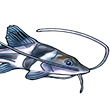Alright, this is a strange one. Umm, I have a cory with a hole in his side. He had some sort of fungal infection many months back, and, though he survived, it ate through some of the armored plating behind his operculum. Picture follows:
<img src="http://www.planetcatfish.com/forum/albu ... pic_id=206"/>
Apologies for not having a better picture; despite his injury, he's one of the more active of the bunch, so he's hard to catch on camera. He's thin, very much so, but he still swims around fairly well. He goes to the surface for air far more than the others and struggles to get there when he does, so he's weak when fighting the current, but he's still alive after 6-8 months, which I find impressive; I thought for sure he'd be dead in days after something like that. I can't tell if the plating has healed at all. I think it may have, but, regardless, there's still a sizeable hole in his side, and I'm wondering if there's anything I can do to make it heal. This guy has character and I'd love for him to get better.
The water conditions have obviously fluctuated over the last eight months, so I'm not sure how useful the current ones will be to you, but at present, parameters are as follows, along with all other information requested:
<b>1. Water parameters</b>
a) Temerature range -- usually 74°-76°F. At present, due to a heat wave and semi-faulty air conditioning, staying at 82°.
b) pH -- 7.4
c,d) GH and KH -- unknown
e)Ammonia -- 0ppm
Nitrate -- 10ppm
Nitrite -- 0ppm
f) Water change frequency -- Between every week and every two weeks. Sometimes multiple times a week.
<b>2. Tank set up</b>
a) Size -- 29 gallons
b) Substrate -- gravel
c) Filtration -- Eclipse 3 hood
d) Furnishings -- various pieces of driftwood, plants, and a pleco cave made of piled up pieces of slate.
e) Other tank mates -- bloodfin tetras, lemon tetras, zebra and blue danios, <i>Corydoras habrosus</i>, a <i>Panaque maccus</i>, and other <i>C. paleatus</i>.
f) How long has it been set-up? A year and a half, give or take a week.
<b>3. Symptoms / Problem description</b> -- Above.
No medications used.
Thanks.
-- Matt
Cory with a hole in his side
- Coryman
- Expert
- Posts: 2119
- Joined: 30 Dec 2002, 19:06
- My articles: 12
- My catfish: 5
- My cats species list: 83 (i:0, k:0)
- My BLogs: 1 (i:0, p:1)
- Spotted: 194
- Location 1: Kidderminster UK
- Location 2: Kidderminster, UK
- Interests: Cory's, Loricariids, photography and more Cory's
- Contact:
Alrighty. Yeah, I know about the temperature thing; I've been doing my best to keep it down with frequent cooler water changes. Thanks for the tip.Coryman wrote:Actually he looks pretty OK to me, the warm temperature will not be appreciated by all the C. paleatus because in their homeland they are used to water in the low 70º's F I think they will be far mor comfortable when the temperature goes a little lower
-- Matt






